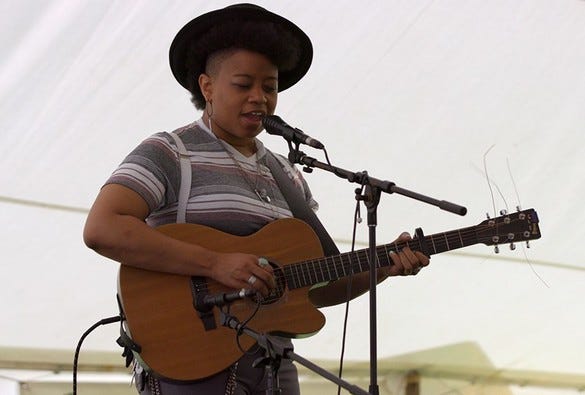Heartland Film Festival: hillbilly

For tickets and showtimes, please click here.
“hillbilly” is filmmaker Ashley York’s homecoming to the Appalachian hills of eastern Kentucky, a place she grew up being told to get away from as fast as possible. But more than that, this documentary is an exploration of the hillbilly archetype -- how it came to be, how it’s used as both cudgel and badge of pride, and how it played into the 2016 presidential election.
We’ve seen these sorts of journalistic explorations before. Invariably they are self-serving jags by Beltway denizens as they make forays into Trump country to train their cameras and tape recorders on the locals to see how they got “that way.” It’s like a zoological expedition.
Not York, who co-directed the film with Sally Rubin. She knows this place, the people, and speaks their language. York acts as both interrogator and empathizer, coming not to judge but illuminate.
Shot during 2016, she starts with her family -- avid Trump supporters to a one. A self-declared feminist, progressive and Hillary Clinton voter, she asks them why they feel the way they do. She questions but does not challenge their beliefs. Steeped deep in the tradition of coal mining that has provided a living for many Kentucky families while ravaging their environment, they responded to a man who proudly embraced their traditions -- and against a woman who vowed to put a lot of them out of work.
From there she seeks out some famous people who came from there or worked there, such as director Michael Apted, whose film “Coal Miner’s Daughter,” along with the seminal documentary, “Harlan County,” showed York that there could be complex portrayals of mountain people beyond barefoot, dimwitted thugs.
She talks to Bell Hooks and Frank X. Walker, African-American writers and thinkers who strive to point out how their cultures have been contributed to Appalachia beyond the “white trash” label. She seeks out the family of Shain Gandee, an enthusiastic living embodiment of the hillbilly caricature who found sudden fame in the TV reality show “Buck Wild” before dying in an accident.
Here’s a sign of what this is a terrific documentary: York spends a lot of time delving into TV and movie depictions of hillbillies, starting with the great-granddaddy of features films, “Deliverance.” Not only does she land an interview with star Ronny Cox, she manages to track down Billy Redden, the man who played the inbred banjo-strumming kid Lonnie in the film.
At first the film doesn’t reveal who he is, other than just a middle-aged guy eking out a living collecting shopping carts from a Wal-Mart parking lot. He’s just a regular man with hopes and dreams, many of them dashed. He jokes about heading out to Hollywood to make it as an actor, while almost immediately acknowledging it probably won’t happen.
We meet the freaky people in Appalachia, folks making art and striving against a wall of conservative politics. Yet the film treats them the same as as the Trump supporters: as subjects ripe for observation.
Some of the keenest exchanges in the film are between York and her grandmother, Shelby Taylor. They gently needle each other about the upcoming election. When Shelby confesses that she once dreamed of getting out of Kentucky and getting an education, York realizes that she lived out her grandma’s vision. In the process she became someone very different from her forbears, and yet what she shares outweighs that which differs.
Insightful, emotional and yet strictly journalistic in its outlook, “hillbilly” is the sort of documentary that makes you feel better for having seen it.



